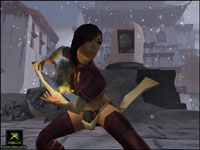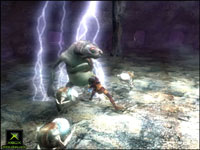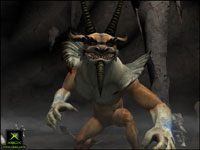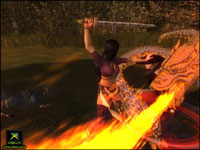

Review: Jade Empire 303
- Title: Jade Empire
- Developer: Bioware
- Publisher: Microsoft Game Studios
- System: Xbox (only)
- Reviewer: Zonk
- Score: 9
Jade Empire begins with another day in the simple life of a martial arts student in the town of Two Rivers. You get to pick who that martial arts student is, and can choose from among several different characters with distinct styles and kung-fu names. Whether you pick Wu the Lotus Blossum or Furious Ming, you'll be introduced to Two Rivers and the Jade Empire combat system via sparring and talking with your fellow students. The idyllic scene is broken by the sneers of a bully and, more seriously, a pirate attack. The aftermath of the pirate attack thrusts you and a few followers onto a path to discover your destiny, rescue a friend, and unravel the truth behind the history of the Jade Empire.
The story-based gameplay, then, is very similar to the Xbox version of KOTOR. You move around the world through various maps people with NPCs, and talk (and talk, and talk) to them. What could have been a frustration is a joy in Jade Empire, as every character's lines are voice acted and the quality of the voice acting is almost universally high. Even minor NPCs get performers with heart assigned to them, and the result is very engaging. By default the entire game is subtitled, but I found that the subtitles were distracting me from the quality vocal performances and I switched them off. The Tho Fan language, made specifically for the game, is subtitled to allow you to follow along with the traditionalists who don't speak english. Without subtitles in most of the conversations Jade Empire is a cinematic experience with you as the protagonist.The cinema of the game is brought to the fore by the impressive graphical presentation Bioware wrings from the Xbox. The graphics are not groundbreaking or extraordinarily realistic, but evoke the world with soft tones, slightly exaggerated character designs, smooth looking animation, and beautiful effects. Much like KOTOR the beauty of the game is occasionally marred by slowdowns, but I found these technical hitches to be relatively rare. Given the story, cinema, and quality voice acting, Jade Empire evokes a well made wire-fu film.
Where there is wire-fu there is combat, and Jade Empire balances the preponderance of storytelling with a thoroughly enjoyable real-time combat system. Unlike Neverwinter Nights or Knights of the Old Republic, you actively control your protagonist character and your reflexes determine the success or failure of the Jade Empire saga. The basics of the combat gameplay, despite this innovation, remain firmly rooted in the d20-like systems of past games. Defeating enemies results in experience gains, and at certain intervals you gain levels. At each level gain you are given points to slot into your attributes to permanently increase them, and points to slot into your martial arts forms to improve their damage, speed, etc.
Your character has three attributes: Body, Mind, and Spirit. In turn, these attributes help determine your consumable personal resources. Body determines Health, Mind determines Chi, and Spirit determines Focus. You also have three social skills: Charm, Intuition, and Intimidate. Bonuses to your attributes affect these skills as well, with a higher Body resulting in more affective Intimidation and a higher Mind resulting in better Intuition. Your attributes, your resource pools, and your social skills can all be modified by amulet jewels. The amulet the protagonist possesses is given to her near the beginning of her quest, a powerful legacy from her mysterious past. By slotting jewels into the amulet you can customize your character beyond the levels you gain. Every jewel modifies one or more attribute or social skill in a specific way. The stones themselves are found at regular intervals throughout the game, and with only a limited number of slots you'll constantly be shifting the stones in your inventory looking for a good combination for combat and social situations. Every character starts with a pair of martial arts styles, and as you move through the game you acquire more through combat, purchasing them, and questing. Every form, in turn, has a specific purpose. Ghosts are unaffected by weapon forms, demons turn aside magic forms, and other forms have supporting roles, such as stunning or blinding opponents. Some forms are pure support, draining chi or focus from your opponents to refill your own bars. Combat itself uses the martial forms in several basic ways, and even small fights tend to be varied enough to keep you on your toes. The basic martial arts forms have three moves: hit, block, and power attack. In the classic rock/paper/scissors style basic hits disrupt power attacks, blocks deflect hits, and power attacks destroy blocks. Each form uses the same moves, with their own variations. Long Sword's power attacks is a sweeping slash, for example, while Spirit Thief (a support/draining form) uses a power attack that fills almost half of your chi bar in one blast. The most visually impressive forms are the shapechanger forms, which allow you to take on the appearance and attacks of a demon or monster. The combat drama unfolds, then, with you switching between four pre-chosen forms (on the D-pad) in such a way as to take advantage of the situation. The flexibility of the combat system makes it rewarding to use, and rarely a chore to work through a battle.The other element that enters into combat, and ties the combat system into the fully realized story of the game, is your companion. As you move through the game (much like KOTOR) you pick up fellow travelers and miscreants who have something to add to your tale. These individuals range from a fellow student and friend from your days at the 2 rivers school to a little girl possessed by a demon to a mad inventor who maintains the airship you travel in. Each of them has a well fleshed out backstory and as events unfold you have the opportunity to delve into their pasts and fish out interesting information and personal insights. The characters are well written and in some cases downright funny. Kang the Mad, in particular, gets some choice lines.
Besides talking with them, you are allowed to choose one to travel with you as you explore, and when you enter combat your companion fights alongside you. The AI is usually effective in their tactical choices. The companion picks a target and stays with it until it's down, countering the baddies moves as best they can. While they do occasionally take out enemies, as is befitting of a game where you are the hero, for the most part they engage supporting characters while you move in on more important targets. If you don't want them mucking up your battlefield you can also choose to place them in support mode. In support mode your companion doesn't fight, but each individual aids you in some specific way over the course of a battle. One companion regenerates your focus as you fight, for example, while another does so with your chi. The added complexity a companion brings to a fight allows for even more options on the field of combat.Next time I hide something, I'm packing explosives around it. Explosives shaped like silver bananas! Stops thieves, monkeys and monkey thieves in one fell swoop. - Kang the Mad
Each companion has their own outlook on life. Some tend more towards a gentle disposition, while others have a harder edge to them. These outlooks reflect the two opposing points of view that your character will choose between as you move through the game. The Way of the Open Palm and the Way of the Closed Fist correlate, roughly, to the light and dark sides of the force as explored in KOTOR. As in those titles, moral choices are presented to you in nearly every conversation and situation. The more you tend towards kindness and understanding, the more enlightened you become towards the way of the Open Palm. The more you tend towards cruelty and indifference, the more accepting you become towards the way of the Closed Fist. Your physical appearance begins to change as you reach a choice along either path, and different martial art forms open up to you as well. In the end, your choice along the two paths determines what your role in the Jade Empire becomes.
Jade Empire, then, is a complicated game. It's a long story (I'm well over 30 hours into it and no where near done), well written, with impressive graphics and memorable characters. The only two real complaints I can lay at the game's feet are occasional slowdowns during combat, and (as with all Xbox Bioware games) sometimes abominably long load times between map areas. Neither of these minor technical hurdles was annoying enough for me to become frustrated by my play experience. Jade Empire is a new high water line for console RPG titles, and in my opinion is Bioware's best work to date. If you enjoy an engaging story, have gotten into Bioware titles in the past, or have a love of well crafted martial arts tales don't let Jade Empire pass you by.




This certainly explains the dupe last story (Score:0, Funny)
arguably (Score:5, Funny)
When Knights of the Old Republic was released it was arguably the best Star Wars tale told since the end of the original trilogy
arguably
You are on Slashdot here, everything here is arguable including statements like:
Re:First Post (Score:2, Funny)
Not likely. It looks like no one even wants an x86 compatible version of Longhorn.
Re:everything here is arguable including statement (Score:5, Funny)
This is not always true. water has multiple phases. For instance, ice is not wet if kept cold, nor is steam wet per se.
Sky is Blue
Are we talking sky of earth here? if not, that is an over broad statement. If so, the sky is not always blue, different weather patterns and polution in the air can and does change this regularly
Pope is Catholic
Define "is" please.
Keeping the flamewars alive, one post at a time
Re:She looks cold. (Score:5, Funny)
Come on, how am I supposed to escape reality if these games aren't totally realistic?
Re:arguably (Score:2, Funny)
Mod this up! I wish I had mod points for this comment! +1 Insightful.
Re:Graphics and sound (Score:3, Funny)
Re:She looks cold. (Score:5, Funny)
-Master: So what do you want to master the Ice or the fire chi?
-Shirtless guy freezing in the snow: Ar-ee y-ouuuu F--ffucking ki-kiiid-dd-ing? (teeth rattling)
-Master: Ok, fire it is!
Re:She looks cold. (Score:3, Funny)
Because she's HOT!
Re:She looks cold. (Score:2, Funny)
Re:Sure its a great RPG.... (Score:5, Funny)
Yeah, but with Morrowind, half of that is spent rebooting your machine.
Re:Sure its a great RPG.... (Score:5, Funny)
--
Evan
Oooo! Oooo! Mee! (Score:1, Funny)
So, are you talking about the MITHRAIC pope?
Re:how does it compare to Planescape: Torment? (Score:3, Funny)